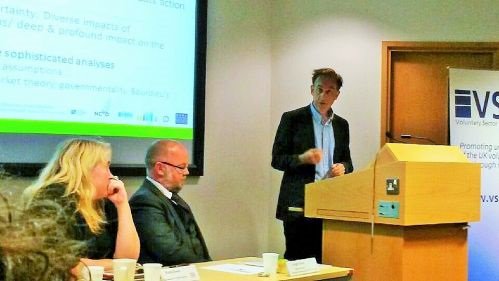This week WISERD Co-Director Professor Paul Chaney was the invited plenary speaker at the 2015 Voluntary Sector and Volunteering Research Conference, which took place at the University of Leeds from 8th – 9th September. The event is the UK’s leading interdisciplinary research conference for academics, policy makers and practitioners with a shared interest in researching issues related to voluntary organisations and volunteering. The event was hosted by the National Council for Voluntary Organisations (NCVO) and the Institute for Volunteering Research (IVR).
Professor Chaney’s speech reflected on the impact of policy reforms, welfare, campaigns and grassroots action, and explored the complexity and uncertainty of the diverse impacts of contemporary reforms and their deep and profound impact on the voluntary sector. It also discussed the emergence of more sophisticated analyses that challenged common assumptions about the nature of changing state/civil society relations, and the associated growth in theory-rich analysis (examples included the use of quasi market theory, governmentality, and Bourdieu’s notion of symbolic power).
Professor Chaney also outlined avenues for future research on civil society. These included: extending future work on the politics of the third sector – with specific attention to a range of areas including: democracy, deliberation; political opportunity structures for voluntary sector participation and “claims making” on political elites; analysis of ideation, agenda-setting and the formative phase of policy-making; as well as the impact of multi-level governance, territorial politics and the impact on third sector organisations of devolution. He also underlined the need for future work in relation to civil society organisations’ adaptation and resilience in the face of austerity and the Westminster government’s neo-liberalism/marketization agenda – as well as greater emphasis on equality and human rights. The plenary session concluded with reflections on methodological practice and a call for greater inter-disciplinary research on civil society, as well as more mixed qualitative and quantitative methods studies – as well as more comparative research.

